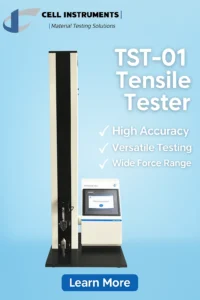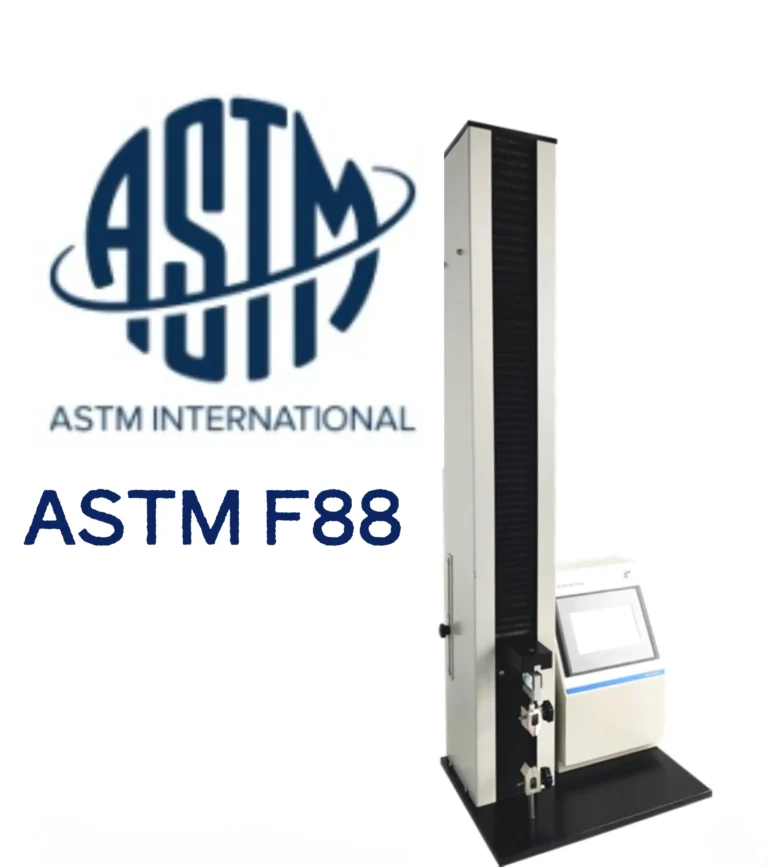ASTM F88
Seal Strength Testing
Seal strength is a critical attribute in flexible barrier packaging, ensuring both product protection and user convenience. ASTM F88, the standard test method for seal strength of flexible barrier materials, offers a reliable approach to evaluating the tensile and elongation performance of heat-sealed film packages. This article explores how ASTM F88 testing works, its relevance to the plastic tensile strength test, and how instruments like Cell Instruments’ Tester wytrzymałości na rozciąganie TST-01 can streamline your quality control and R&D operations.
Importance of Seal Strength and Tensile Testing
Flexible packaging is widely used across food, medical, and pharmaceutical sectors, where seal integrity is essential for product safety and shelf life. According to ASTM F88, seal strength not only validates sealing process consistency but also correlates with packaging performance, including opening force, barrier protection, and compliance with quality assurance standards.
Beyond seal strength, materials engineers and QA professionals must understand the tensile strength of polyethylene (PE) and other films. Whether you are conducting a plastic tensile strength test or evaluating the tensile and elongation properties of multilayer laminates, having a robust testing setup is essential to detect defects and ensure compliance.
Understanding ASTM F88: Procedures and Techniques
ASTM F88 defines three testing techniques—A (Unsupported), B (Supported 90°), and C (Supported 180°)—which are used depending on the seal design and test objective. Each technique simulates different real-world conditions of how seals might be stressed during opening or transportation.
Procedure Highlights:
Użyj tester wytrzymałości na rozciąganie with a constant rate of jaw separation (200–300 mm/min).
Ensure proper sample preparation: seals must be centrally aligned and free from pre-test stress.
Measure maximum force and optionally the average seal strength if required.
Report failure modes such as adhesive failure, cohesive failurelub delamination.
In some cases, plotting force vs. grip travel enhances result interpretation.
Cell Instruments recommends using the Tester wytrzymałości na rozciąganie TST-01 for ASTM F88 testing. This equipment offers high precision and programmable control, ensuring accurate measurement of seal strength, tensile strength, I elongation tensile test data. It meets the ±2% accuracy requirement and supports programmable grip travel ranges, enabling advanced data capture and reporting.
Film Tensile Strength and Elongation Testing: Standards and Methods
While ASTM F88 focuses on seal strength, film tensile performance is governed by ASTM D882, the standard test method for determining the tensile properties of thin plastic sheeting. Understanding the tensile strength measurement I elongation characteristics is essential for selecting packaging materials and validating heat seal designs.
Key Metrics Include:
Tensile strength of polyethylene (PE tensile strength): Essential for load-bearing capacity and durability.
Elongation at break: Indicates material flexibility and resistance to tearing.
Tensile and elongation test outcomes**: Help optimize seal geometry and packaging line parameters.
In practical terms, how do you measure tensile strength? A film strip is clamped and stretched at a constant rate until it breaks. The tensile tester records the maximum stress the sample can withstand and calculates the elongation percentage at break.
Ten Tester wytrzymałości na rozciąganie TST-01 is well-suited for this type of testing, with high-resolution load cells, real-time curve plotting, and built-in software to analyze film tensile strength I heat seal strength in a single platform.
Packaging Test Equipment: Enhancing Quality and Compliance

High-quality packaging test equipment is vital for labs performing routine tests or development work. Cell Instruments provides solutions tailored for:
Plastic tensile strength test and elongation analysis
Heat seal strength validation via ASTM F88
Process capability evaluation and production line optimization
Ten TST-01 not only complies with both ASTM F88 and ASTM D882 but also minimizes operator error through automation and digital control. With customizable grips and cutting templates, it adapts to a wide range of packaging formats and material types.
Why Choose Cell Instruments for ASTM F88 and Tensile Testing?
At Cell Instruments, we understand that precision, repeatability, and compliance are non-negotiable for quality assurance professionals. Whether you work in food safety, pharmaceuticals, or medical device packaging, our testing instruments are designed to meet stringent global standards and deliver accurate tensile and elongation test results every time.
With a deep understanding of materials science, we also offer custom automation and test solutions, helping you adapt to evolving regulatory requirements and production environments.
Contact Us Get ASTM F88 Test Method
From validating heat seal strength using ASTM F88 to measuring the tensile strength of polyethylene, understanding the mechanical properties of packaging films is essential for ensuring product integrity. Through reliable testing methods and high-precision instruments like the Tester wytrzymałości na rozciąganie TST-01, Cell Instruments supports manufacturers and quality control teams in delivering safe, compliant, and high-performance packaging solutions.
Często zadawane pytania
ASTM F88 is the standard test method for measuring the seal strength of flexible barrier materials. It ensures that heat-sealed packages maintain integrity during handling and storage, making it crucial for industries like food, pharmaceuticals, and medical devices.
Seal strength is measured by placing the sealed sample in a tensile tester and pulling it at a constant speed (200–300 mm/min) until it separates. The peak force required to break the seal is recorded as the seal strength. Techniques A, B, or C may be used depending on the sample orientation.
A tester wytrzymałości na rozciąganie, such as the Tester wytrzymałości na rozciąganie TST-01 by Cell Instruments, is used. It must have constant-rate jaw separation, precise load sensors (±2% accuracy), and the ability to calculate or display average seal force and force–displacement curves.
Seal strength refers to the force needed to separate sealed layers in a package, while tensile strength measures how much stress a film or material can withstand before breaking. Both are critical for packaging performance but evaluate different material properties.
Yes. Advanced machines like the Tester wytrzymałości na rozciąganie TST-01 can perform both heat seal strength tests (ASTM F88) I film tensile strength tests (ASTM D882). With programmable test settings and interchangeable grips, it offers a versatile solution for complete film package evaluation.

